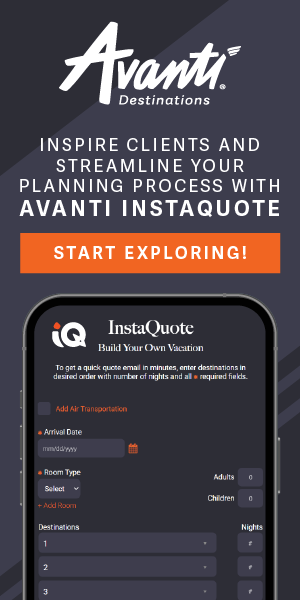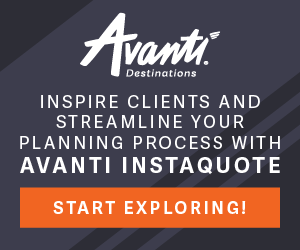A Guide to Marketing for Travel Advisors
by Richard D’Ambrosio
Expert travel agents are turning that expense line item into dollars in their bank accounts. Photo: Shutterstock.com.
When travel agents think about marketing, most frequently they think of a set of activities designed to get their business in front of more prospective sales leads, maybe including magazine/newspaper ads, consumer expo booths, and some kind of paid digital advertising.
While these all are part of a marketing plan, successful professional advisors are taking these activities, and with targeted marketing skills, turning that expense line item into dollars in their bank accounts.
Maggie Fischer spent five years as chief marketer at CCRA (a travel agent membership network that links advisors and suppliers), leaving this past March to launch the Travel Industry Marketing Association (TIMA). Today, she is on a mission to help travel advisors and suppliers master marketing strategies and skills.
“After working for so many years with travel agencies and suppliers, it was always striking how little the two groups really knew about one another, in terms of how to communicate effectively,” Fischer said. “Being in the middle of that dynamic, it became clear that both sides really need help developing their messages, their creative work, and their brands.”
TIMA will offer marketing support, resources, and advice, offline and on. “I want to take what’s been a very ‘Here, sell this’ approach, and evolve that into a much more polished collaboration, driving more sales for everyone and elevating the profile of travel agencies everywhere,” she said.
Travel Market Report interviewed Fischer less than a month from TIMA’s launch, to gain her insights and tips for successful marketing strategies.
What is the difference between marketing and sales?
Marketing is all about planting seeds. You want to plant them everywhere, nurture them over time, and with specific approaches. It’s all about establishing credibility and creating an environment to smoothly transition to a sales conversation.
If your marketing has set the tone and expectation around price points and you’ve qualified your prospect correctly, your sales process can be product- and experience-focused. Trying to sell a luxury experience in Bali to someone expecting a budget cruise means you skipped the marketing and qualification process. That’s an extreme example, but it’s all about attracting the right prospects, qualifying them, and getting to know them before putting a product in front of them.
Is marketing for brand awareness worth it for a travel agent?
Brand awareness campaigns are a crucial step in your marketing cycle, regardless of budget. Every buyer goes through a pretty dependable cycle before making a purchase. If you skip brand awareness, you’re only going to capture clients who want you to fulfill an order, and then it’s going to be a price war, a race to the bottom.
You want to do everything you can to capture prospects early in the inspiration phase so that you can apply all of your skills and knowledge in shaping an experience. Develop three inspiring/helpful messages for a simple paid Facebook campaign with a budget of, say, $150 a month. Make it something timely and focused like, “By this time next year, you could have an amazing travel story to tell …” or “Don’t just tell your children about the world. Show them …”
Then send them to a landing page to collect basic contact info, and get them to opt-in to you sending them an inspiring destination once a month. One of those months, they’re going to be ready, and so will you. So, although it may seem like fluff with no immediate ROI … it’s just as important as every other aspect of your marketing.
How do travel advisors perceive marketing and generating ROI for their business, versus the reality of how it works?
Some of the most startling realizations I’ve seen center around the amount of time it takes an agent to nurture a lead, what lead generation really is, and then the absolute catastrophe it can be if you don’t take a serious brand inventory before you start. Many lead generation programs promise quick wins and create expectations but leads are just sitting there waiting to be closed. In reality, many of those leads are aging by the second, and those prospects may not even understand why you’re calling them when you do.
Agents need to start by asking the lead if they’re still thinking about taking a trip – and if you can be of assistance. If they’re not looking to purchase right now, ask if it’s ok to reach out monthly to check in. They’ll appreciate the friendly, non-demanding approach. Jumping in with a “What’ll it be?” doesn’t work well outside of a diner.
Also, step back and adjust your definition and expectations of sales leads and lead generation. It’s easy to calculate ROI when you have a client’s cash in hand – but that’s not the only measure of success. Remember, it’s Return on Investment – and that investment can be your time, too. Before you embark on any of these activities, go through your touchpoints and ask yourself:
- Am I using my agency name properly and consistently across the board? Are there differences across my website, emails, etc.? You should have one clear, consistent name. Period.
- Is your logo modern, easy to work with, and recognizable? If you had your cousin’s old roommate design it five years ago, it’s probably time to refresh with a pro.
- Is your email address professional and polished? No using Luv2Trvl@aol.com. It’s not professional and isn’t going to instill much trust.
- Are you posting personal stuff on your agency’s social media? If so, please stop right now, and go delete, delete, delete! Anything you post should be travel-focused and non-opinionated.
What are the most successful marketing activities a travel agent can engage in to generate some kind of ROI?
Some of the most successful agents I’ve worked with spend their time creating content that guides travelers through the planning process, giving tips on everything from packing properly to getting yourself out of jail in a foreign country. Content like that gets shared, and every read dramatically increases your credibility and the likelihood someone is going to remember you when it’s time to plan their trip. If you want to attract luxury-minded clients, make sure your brand reflects that. If you’re trying to sell more group family cruises, then your marketing should be full of tips on family travel, cruising, etc.
Describe a great marketing example by a smaller agency and why you think it was effective?
I recently worked with a phenomenal agent who did a fantastic job qualifying my wants and needs, setting the right expectations around working with them, and creating the perfect environment for a conversation that resulted in a sale. (I am certain it was quite a bit larger than she was expecting.)
She asked questions that inspired me to think bigger and really make some decisions about what I wanted out of the experience, like, “What kinds of memories do you want to come away with?” and “What kinds of changes do you want this experience to jumpstart in your life?”
These somewhat intense qualifying questions are the kind of marketing that will drive not only sales, but loyalty and repeat business. Knowing I will never have to explain my preferences to anyone else is going to keep me with her forever.
How do websites, email and social media play a role in a travel agent’s marketing program?
Think of your website as your storefront. If someone walks in and it seems like no one has been there for a decade, there’s outdated furniture and posters falling off the walls, what do you think their next move will be? Yep, maybe not a full sprint, but you’ll never see them again.
Your social media is your microphone. Social media should be boosting your brand through a combination of your website, your materials, and your customer experiences. You can destroy a company with one post these days … so treat social media like an open mic in Times Square. Make sure what you say is professional, has a point and a call to action, and isn’t personal or political. Stay focused on putting useful, helpful, and positive content out there.
Email is great, but to use it effectively you have to evolve your thinking from a single-email effort to a more comprehensive campaign – even if it is to your existing customers. Start looking at email automation tools, a/b testing, using personalization tokens, and creating emails that feel more like a personal greeting.
A good CRM will help you record and manage your client and prospect preferences, behaviors, and be a resource for ensuring you’re putting the right content, options, and format in front of the right people. Many CRMs will also help you keep your emails, social media, and landing pages in lock step.
Maggie Fischer established DCM, a creative branding firm catering to the travel and tech industries, just outside of Philadelphia in 2002, serving fortune 500 clients and garnering local and national awards. In 2006, she joined Airlines Reporting Corporation (ARC) to lead their creative services department, overseeing the company’s complete rebranding in 2010. In 2014, Maggie became CCRA’s chief marketing officer, shortly after they acquired OSSN and the TRUE Code. She developed the TRUE brand, as well as CCRA’s hotel, air, and call center marketing programs and brands, CCRA supplier marketing programs, and helped launch their PowerSolutions national conference. Fischer received her BFA in Graphic Design from the Savannah College of Art & Design.
























